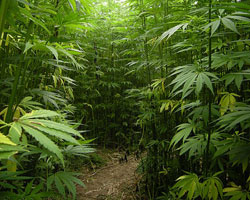Hemp Clears a Hurdle

Last Monday, a bill that would legalize growing hemp in Kentucky for industrial use cleared a state legislative committee with a unanimous vote following testimonies by Senator Rand Paul and state Representatives John Yarmuth and Thomas Massie.
“We’re just very happy and excited and very appreciative of the state Senate for their overwhelming support and we look forward to a good, open, fair debate in the House,” said Agriculture Commissioner James Comer. “There’s a desperate need to create jobs in Kentucky and this is one way to do it.”
Currently, hemp is classified as a prohibited controlled substance along with marijuana. Both plants are of the same species, Cannabis sativa, but hemp has only a trace of THC, the psychoactive ingredient in marijuana. Throughout American history, hemp has been a vital crop and several of the founding fathers even grew it on their estates. Thomas Jefferson once said “hemp is of first necessity to the wealth and protection of the country” and Levi Strauss’ original denim jeans and the first American flag were made of hemp. Hemp fibers can produce furniture, rope, housing insulation, a durable alternative to tree-based paper and a multitude of other products. The sustainable crop grows very quickly and requires no pesticides, no herbicides and only moderate amounts of fertilizer. In his testimony, Senator Paul announced he was wearing a shirt made with hemp that he bought in Canada, where growing hemp crops is permitted.
“The utilization of hemp to produce everything from clothing to paper is real,” Senate Minority Leader Mitch McConnell affirmed.
Additionally, hempseeds and hemp oil are an extremely nutritious superfood. Hemp is the only plant that contains all of the essential fatty acids and amino acids required by the human body and it is also very high in protein and fiber. And unlike grains, nuts and legumes, hemp has no enzyme inhibitors, making it easy to digest. Hemp oil has a ratio of Omega 6 to Omega 3 fatty acids that mirrors the primitive diet the human race evolved from for 2.5 million years and offers a plentiful source of gamma linelenic acid, vitamin E, oleic acid and Omega 9s – plus it has the lowest saturated fats of any common plant oil.
Though the crop touts a great deal of beneficial uses, Rodney Brewer, the commissioner of the Kentucky State Police, argues that if hemp farming were legal, marijuana growers would hide their plants in hemp fields, where the police would not be able to tell the crops apart from one another.
“They are identical in appearance when it comes to the naked eye,” Brewer said.
But former CIA Director James Woolsey, who also testified in favor of the bill Monday because of his “interest in prosperity for rural America,” believes that marijuana growers would not conceal plants in a hemp field because hemp can cross-pollinate with marijuana and lower the concentration of THC.
Marijuana growers “hate the idea of having industrial hemp anywhere near,” he said, adding arguments that hemp is a narcotic on par with marijuana is “pretty much exactly like saying you can get drunk on (the low-alcohol) O’Douls (beer). It’s very difficult.” Senator Paul agreed.
“It’s a crop that’s legal everywhere else in the world except the United States,” Paul noted. “…If I thought this was going to allow marijuana to take off in our state, I wouldn’t be for it.”

